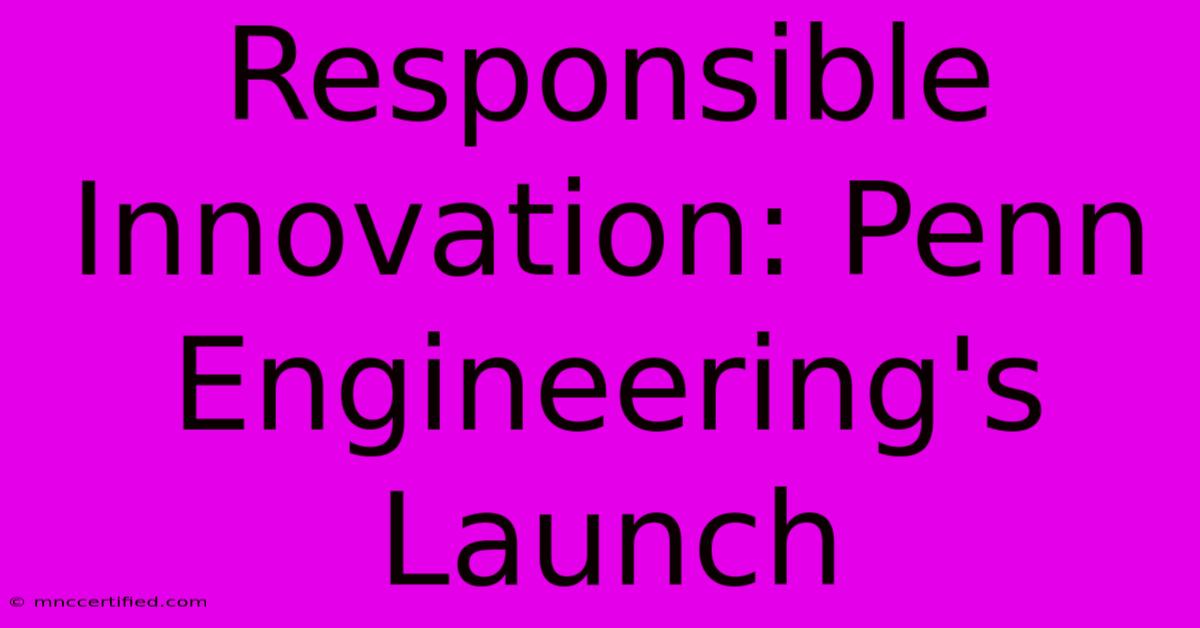Responsible Innovation: Penn Engineering's Launch

Table of Contents
Responsible Innovation: Penn Engineering's Launch – A New Era of Ethical Tech
The University of Pennsylvania's School of Engineering and Applied Science (Penn Engineering) has launched a groundbreaking initiative: Responsible Innovation. This isn't just a buzzword; it's a comprehensive program designed to integrate ethical considerations into every stage of technological development. This article delves into the details of this launch, exploring its significance and implications for the future of engineering and technology.
What is Responsible Innovation?
Responsible Innovation goes beyond simply avoiding harm. It's a proactive approach that considers the social, ethical, and environmental impacts of technology from its conception to its deployment and beyond. It asks crucial questions:
- Who benefits? Does the technology exacerbate existing inequalities or create new ones?
- Who is harmed? What are the potential unintended consequences?
- What are the long-term environmental impacts? Is the technology sustainable?
- How can we ensure transparency and accountability? How can we build trust in the technology?
Penn Engineering's initiative tackles these questions head-on, aiming to equip the next generation of engineers with the tools and frameworks necessary to navigate the complex ethical dilemmas inherent in technological advancement.
Key Pillars of Penn Engineering's Responsible Innovation
The program is built upon several key pillars:
- Curriculum Integration: Ethical considerations are being woven into existing engineering curricula, ensuring that students learn about responsible innovation alongside technical skills. This includes case studies, workshops, and ethical frameworks.
- Research Initiatives: Penn Engineering is funding research specifically focused on the ethical implications of emerging technologies, fostering a culture of critical inquiry. This includes research into AI ethics, data privacy, and sustainable technology.
- Community Engagement: The program fosters dialogue and collaboration with stakeholders outside of academia, including industry partners, policymakers, and community members. This collaborative approach ensures that the ethical considerations are grounded in real-world contexts.
- Policy and Advocacy: Penn Engineering is actively engaging in policy debates and advocating for responsible technological development at the local, national, and international levels. This ensures that research translates into meaningful action.
The Significance of Penn Engineering's Launch
Penn Engineering's initiative is significant for several reasons:
- Setting a Precedent: It sets a precedent for other engineering schools to follow, demonstrating the importance of integrating ethical considerations into engineering education and research.
- Addressing Urgent Needs: It directly addresses the urgent need for ethical frameworks in the rapidly evolving technological landscape. The unchecked development of powerful technologies without consideration for their impact can have devastating consequences.
- Cultivating Ethical Leaders: By educating students in responsible innovation, Penn Engineering is cultivating the next generation of ethical leaders in the tech industry. This is crucial for shaping a future where technology serves humanity, rather than harming it.
The Future of Responsible Innovation
The launch of Penn Engineering's Responsible Innovation program marks a crucial turning point. It demonstrates a commitment to ensuring that technological advancement is guided by ethical principles and a deep understanding of its societal impact. This initiative serves as a powerful model, inspiring similar efforts across the globe and paving the way for a future where technology is developed and deployed responsibly, for the benefit of all.
Keywords: Responsible Innovation, Penn Engineering, Ethical Technology, AI Ethics, Sustainable Technology, Engineering Ethics, Social Impact of Technology, University of Pennsylvania, Technology Ethics, Data Privacy, Ethical Frameworks, Technological Advancement
Off-Page SEO Strategies:
- Promote the article on social media platforms relevant to technology and ethics.
- Reach out to relevant influencers and journalists in the tech and ethics space.
- Submit the article to relevant online directories and publications.
- Build high-quality backlinks from reputable websites and blogs related to the topic.
This comprehensive approach will help this article rank well in search engine results and reach a wider audience interested in responsible innovation and the significant work being done at Penn Engineering.

Thank you for visiting our website wich cover about Responsible Innovation: Penn Engineering's Launch. We hope the information provided has been useful to you. Feel free to contact us if you have any questions or need further assistance. See you next time and dont miss to bookmark.
Featured Posts
-
Prescotts Legacy Shaping Rayners Career
Nov 22, 2024
-
Briton 18 Faces Dubai Jail
Nov 22, 2024
-
Antique Car Insurance In Florida
Nov 22, 2024
-
Tesla Insurance Premium Increase
Nov 22, 2024
-
Julian Lewis Commits To Colorado 2025
Nov 22, 2024